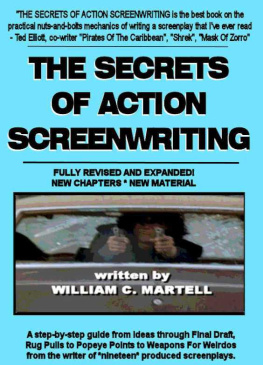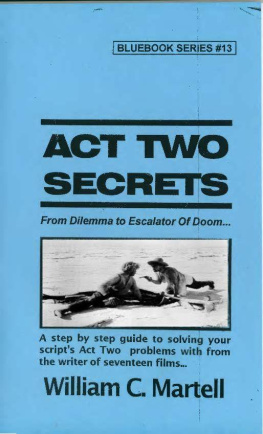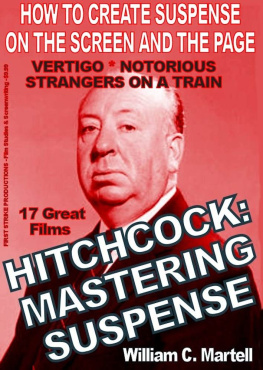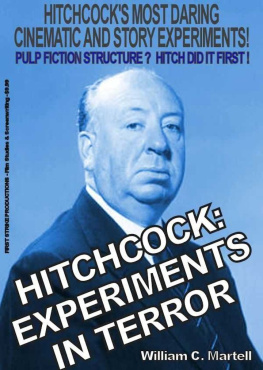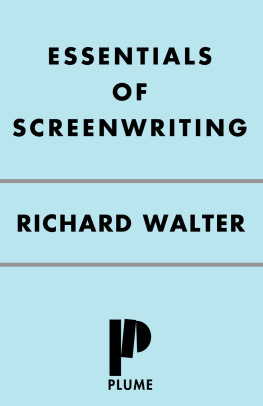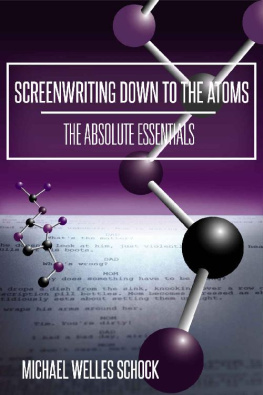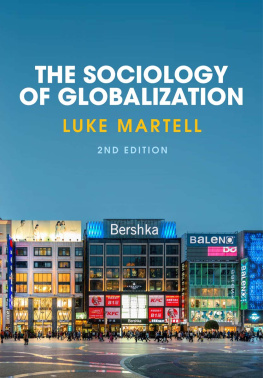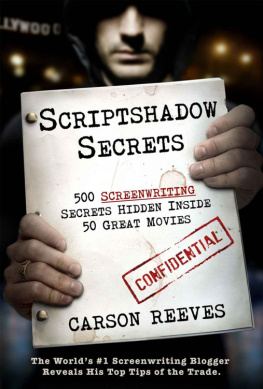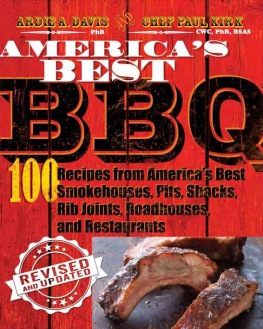Martell - The Secrets Of Action Screenwriting (fully revised edition)
Here you can read online Martell - The Secrets Of Action Screenwriting (fully revised edition) full text of the book (entire story) in english for free. Download pdf and epub, get meaning, cover and reviews about this ebook. year: 2000,2011, publisher: First Strike Productions, genre: Art. Description of the work, (preface) as well as reviews are available. Best literature library LitArk.com created for fans of good reading and offers a wide selection of genres:
Romance novel
Science fiction
Adventure
Detective
Science
History
Home and family
Prose
Art
Politics
Computer
Non-fiction
Religion
Business
Children
Humor
Choose a favorite category and find really read worthwhile books. Enjoy immersion in the world of imagination, feel the emotions of the characters or learn something new for yourself, make an fascinating discovery.
The Secrets Of Action Screenwriting (fully revised edition): summary, description and annotation
We offer to read an annotation, description, summary or preface (depends on what the author of the book "The Secrets Of Action Screenwriting (fully revised edition)" wrote himself). If you haven't found the necessary information about the book — write in the comments, we will try to find it.
Martell: author's other books
Who wrote The Secrets Of Action Screenwriting (fully revised edition)? Find out the surname, the name of the author of the book and a list of all author's works by series.
The Secrets Of Action Screenwriting (fully revised edition) — read online for free the complete book (whole text) full work
Below is the text of the book, divided by pages. System saving the place of the last page read, allows you to conveniently read the book "The Secrets Of Action Screenwriting (fully revised edition)" online for free, without having to search again every time where you left off. Put a bookmark, and you can go to the page where you finished reading at any time.
Font size:
Interval:
Bookmark:
THE SECRETS OF
ACTION SCREENWRITING
by
William C. Martell
FIRST STRIKE PRODUCTIONS
THE SECRETS OF ACTION SCREENWRITING
New Revised Edition
ISBN:
Copyright 2000, 2011 by William C. Martell
All rights reserved. No part of this book may be reproduced or transmitted in any form or by any means, electronic, mechanical, or telepathic, including photocopying, recording, or any information and retrieval system, without the prior written permission of the Writer, except by a reviewer who may quote brief passages in a review.
First Strike Productions
11012 Ventura Blvd #103
Studio City, CA 91604
http://www.ScriptSecrets.Net
Bill's book THE SECRETS OF ACTION SCREENWRITING is "The best book on the practical nuts-and-bolts mechanics of writing a screenplay I've ever read." - Ted Elliott, co-writer "The Mask Of Zorro", "Shrek", "Pirates Of The Caribbean 1-4", The Lone Ranger.
"His book is dangerous. I feel threatened by it." - Roger Avary, Oscar winning screenwriter, "Pulp Fiction", Beowulf.
"William C. Martell knows the action genre inside out. Learn from an expert!" - Mark Verheiden, screenwriter, "Time Cop", "The Mask" and TV's "Smallville", Battlestar Galactica and Heroes.
"My only complaint with SECRETS OF ACTION SCREENWRITING is that it wasn't around when I was starting out. The damned thing would have saved me years of trial and error!" -Ken Wheat, screenwriter, "Pitch Black" and "The Fly 2".
"Finally a screenwriting book written by a working professional screenwriter. Bill Martell really knows his stuff, showing you how to write a tight, fast screenplay." - John Hill, screenwriter, "Quigley Down Under".
"William C. Martell is the Robert Towne of made for cable movies," - Washington Post reviewer David Nuttycombe.
"There's an art to writing for guys like Chuck Norris, and thanks to Bill Martell's book I was prepared." - Genia Shipman, "Walker Texas Ranger", "Sons Of Thunder".
Welcome to the new edition of Secrets Of Action Screenwriting. You know, I never set out to write a best selling screenwriting book that would go for $510 as a rare edition on Amazon when it went out of print. All I ever wanted to do was write screenplays. After selling a script to a producer with a deal at Paramount, I quit my warehouse job and moved to Los Angeles to begin writing full time. I subscribed to every screenwriting newsletter or magazine, including the little newsletter that would eventually become Script Magazine. Almost every article was from some guru trying to sell their book or class. When I complained that no one seemed to have any actual screenwriting experience, the newsletter gave me a regular column... without pay.
As I continued to sell scripts and have them actually get produced, my friends started giving me their action and thriller scripts to read for feedback... and I found myself typing up the same notes again and again. So I created a master list of notes in a red booklet. Now I could say, Read page 12, page 17, page 32 and page 49. When the booklet expanded to 100 pages, a friend suggested I throw a cover on it and sell it. That was the first version of this book, made at a copyshop in the early 1990s; and up until *this* version, some of the chapters and sections remained completely unchanged. If you are one of the hundred people with one of those booklets, you have a real collectors item.
Another friend thought that little red booklet was the best screenwriting book he had ever read, and suggested I expand it and find a publisher. I wrote some new material, beefing the book up to 240 pages, then sent it to several publishers who specialized in film and screenwriting books. They all turned it down for the same reason - it focused on a single genre. One of the publishers suggested I rewrite the book so that it would be about general screenwriting and let them look at the new version. I thought they were all missing the point - the shelves were already flooded with general screenwriting books, but there wasnt a single book on how to write a specific genre. And Secrets Of Action worked well as a general screenwriting book even though it *also* contained techniques used in the action genre. I believed in my book.
So I took the money from my next screenplay sale, found a printer, and became my own publisher. When that run sold out, I switched printers and did another couple of runs. I was the top selling screenwriting book in the Sam French bookstores - they couldnt keep them on the shelves! Amazon sold hundreds every month, and the book ended up a featured selection of a film and theater bookclub. Other books that focused on a single genre began popping up on the bookstore shelves... many from the same publishers who wanted me to rewrite this book.
Those old chapters and sections from the original master list of script notes bothered me - they needed a page one rewrite. Plus, many of the film references were decades out of date. I decided not to do another print run until Id done a complete rewrite on the book... which became difficult, because my real job is writing screenplays. For a few years this book remained out of print while I wrote scripts, did endless rounds of studio meetings and did jury duty on Film Festival juries around the world.
But now the time has come to revise the book, to add what Ive learned over the past few years and examine the way the action film has evolved in the 21st Century. I have not only updated the book, I've almost doubled it in length by added new techniques and tools and digging deeper into why one film is a classic and another is now forgotten. The last version of the book was 240 pages, this version is over 460 pages!
The purpose of this book is to give you the tools necessary to write an action or thriller screenplay, not to tell you how to write. There are places in the book where I might say "On page 25, THIS happens"... Those are guidelines, not part of some by-the-numbers formula which must be adhered to. Whether your Plot Point happens on page 24 or 26 or 32 or doesn't happen at all, depends on the individual script you are writing. Every screenplay and every story is different.
Instead of rules or formula, think of this book as a tool box. Some of the tools you may never use, other tools you may end up using constantly. One of the reasons for reading a book on screenwriting or any creative endeavor is to call attention to tools and techniques you may have never noticed before. There's a certain Rashomon Effect where five people might watch the same movie or read the same script and each comes away with a different technique one of the purposes of a book is to point out the techniques I have noticed after many viewing and studying the screenplay... and explaining the way the techniques work. You may have never noticed that tool before, and it may be exactly what you need for your next screenplay.
There is only one rule in screenwriting: the script has to work. No one cares what method you used to create the script or how many rules you followed or broke, they only care that the script is so exciting that they cant put it down... and they cant wait to buy it and put it on screen. Skip the rules, use the tools to write the best script possible.
Ready to open the toolbox and build something?
William C. Martell, December 2011, Studio City, CA.
The most important element of an action film isn't the hero, isn't the sidekick, isn't the dialogue, and isn't the plot. The most important element of an action film is *the Villains Plan*.
Why? Hitchcock said, "The better the villain, the better the picture". The Villain's Plan is the fuel for the story. The Villain brings the conflict, and story *is* conflict... no matter the genre. In a romantic comedy, if boy can easily get girl you dont have a story. In a drama, nothing very dramatic can happen unless there is a conflict. Conflict is the key to story... and that is what makes the Villain (or antagonist or force of antagonism) the most important character in your screenplay. Take your average cop show on television - it always begins with a crime, and *then* the cops become involved. No crime, nothing for the cops to do! That CSI team can not begin searching for evidence unless there is a crime. The Homicide detectives cant start questioning witnesses unless there was some crime for them to witness. The mediums and mentalists and Monks cant do anything until the villain has committed some crime. When writing your action screenplay, remember that the villain is your most important character - they bring the conflict.
Font size:
Interval:
Bookmark:
Similar books «The Secrets Of Action Screenwriting (fully revised edition)»
Look at similar books to The Secrets Of Action Screenwriting (fully revised edition). We have selected literature similar in name and meaning in the hope of providing readers with more options to find new, interesting, not yet read works.
Discussion, reviews of the book The Secrets Of Action Screenwriting (fully revised edition) and just readers' own opinions. Leave your comments, write what you think about the work, its meaning or the main characters. Specify what exactly you liked and what you didn't like, and why you think so.

